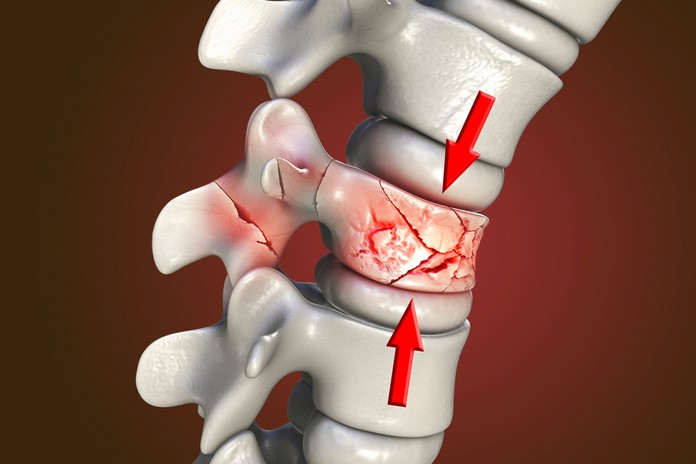Spinal fracture

Causes
The most common cause of a spinal fracture is trauma. A traumatic event such a car crash or an elderly fall can cause a spinal fracture. However, many patients also have what we know as a pathologic fracture. Those are caused by a hit that would normally not lead to a bone fracture. The bone was weak already due to osteoporosis or another degenerative process, and the hit was enough to break the weakened structure of the bony tissue.
Stress fractures are also found in the spine. They are due to ongoing microscopic fractures and tears due to repetitive movements. They are known as spondylolysis, and it is more common in children and adolescents who participate in gymnastics, weight lifting, and other sports that place a repetitive stress on the back.
Risk factors
One of the most common risk factors is aging, because the bone naturally loses its structure and strength, becoming more likely to break after a hit
Osteoporosis and osteopenia are both bone mineralization problems that lead to bone fractures in the spine and other parts of the body
Female patients are at a higher risk, especially after menopause and when their estrogen levels start to drop
If you take many oral steroids and anti-depressants, your bones may be weakened and at risk of spinal fractures
If you have an existing fracture of the spine, the chance of having another is higher
Smoking increases your chance of spinal fractures as well as alcohol and living a sedentary life
Symptoms
Severe back pain with a very sudden onset
Pain is worsened by walking or standing and improves when the patient is lying down
The mobility of the spine is severely limited
Height loss due to the structural change of the spine
Deformity of the spinal structures clearly evident or as evidenced by imaging studies
Diagnosis
The diagnosis of spinal fractures should be suspected for patients of 50 years of age or more who have a sudden onset of back pain. It is particularly common in women after their menopause, and should be suspected in patients with osteoporosis.
After the diagnosis is suspected, it should be confirmed with an X-ray to evaluate the location and extent of the fracture. In some cases, a CT scan can be also ordered, especially when doctors need to see details of the bone structure. If they believe that the nerves are also compromised, they may order an MRI as well.
Treatment
Treating a fracture requires stabilization to prevent a more extensive injury and stabilizing the fracture with surgery or bracing depending on the extent.
Braces are recommended to maintain spinal alignment and immobilize the spine. They restrict movement and help with the pain symptoms. In some minor cases, they are enough to correct fractures.
When fractures are unstable, a surgical procedure is required to join the fractured parts of the vertebra with a bone graft, hooks, screws, and other instruments. In some cases, a minimally-invasive procedure known as kyphoplasty or vertebroplasty is made to treat a compression fracture due to a spinal tumor or osteoporosis.
Home remedies
If you believe that you have a spinal fracture, it is important to look for medical assistance right away. If you already received medical attention and are now recovering, you can still do a few things to contribute to your recovery. Consider these recommendations:
Remember to reduce the dosage of the pain medication as the symptoms start to subside. Only use when needed.
Rest as long as the recovery process takes to heal your spine. Do not start hassling around just because you think that you’re now feeling alright.
Go to your physical therapy sessions to recover the mobility of your back
Keep using your braces as the doctor recommended
Use cold therapy if you need to relieve pain. It will also help you reduce swelling and speed up healing
If your doctor gave you more recommendation, follow them without hesitation. If you have any question, ask your doctor and trust his advice. Look for a second medical opinion if you’re not entirely sure, but never trust your own judgment or understanding over that of a healthcare professional.
